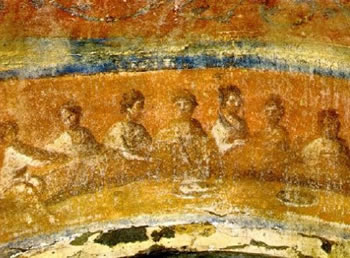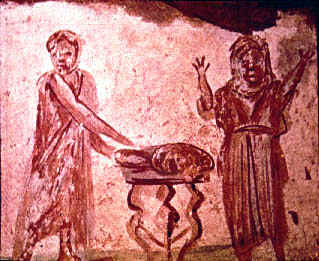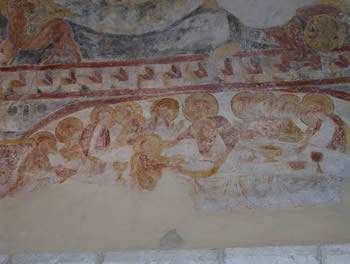For Sunday August 28, 2022
Lectionary Readings (Revised Common Lectionary, Year C)
Jeremiah 2:4–13 or Sirach 10:12–18 or Proverbs 25:6–7
Psalm 81:1, 10 –16 or Psalm 112
Hebrews 13:1–8, 15–16
Luke 14:1, 7–14
From Our Archives
See the two essays by Debie Thomas, Table Manners and Places of Honor (2019)
In her article "The Lost Art of Eating," the historian Ingrid Rowland argues that food is about a lot more than mere nutrition. Beyond feeding our animal appetites, there are matters of conscience. Food ecology is important, but so is a food ethic. There's more to food than buying organic or being vegan.
Where you eat, what you eat, how much you eat, when you eat, and who you eat with all suggest something about your identity, your community, and certainly your social status. Rowland thus says that food has often been "the all-sufficient metaphor for power." In fact, that's a distinctly Biblical idea, and at the heart of this week's gospel in Luke 14.
Food plays a conspicuous role throughout the Bible. Jews celebrate liberation from Egypt with the Passover meal. Many of their 613 mizvot or commandments deal with dietary guidelines. Jesus's first miracle was to turn water into wine at a wedding party. The gospels speak of the Last Supper, the Lord's Supper, and the Great Supper — all material signs that signify spiritual realities.
There are stories about feeding the multitudes, feeding the hungry, eating with dirty utensils, farming, fasting, which foods are ritually clean or unclean and why, whether a believer could eat meat that had been sacrificed to pagan idols and then afterwards sold in the local market, and the poor begging crumbs from the rich. Luke 14 is only one of several stories that Jesus told in which food is a metaphor for power that builds or destroys human community.
 |
|
The eucharist, "take and eat."
|
Jesus often ate with fringe people, so much so that his critics disparaged him as a glutton and a drunkard. For the religiously scrupulous person of his day, to eat with a "dirty" person defiled you and made you impure before both God and humanity.
But Jesus also ate with religiously zealous and socially powerful people. That's where we find him in Luke 14. When Jesus was eating dinner with a "prominent Pharisee," he commented on both the guests and the hosts.
The guests at the party clamored for "places of honor" at the table. To insinuate ourselves into places of importance, to wheedle a prestigious invitation, to be seen at the right eatery with the right people, all these behaviors are what we're inclined to do. It's human nature.
When I was in Oxford in the fall of 2002, I attended the Evensong service almost every night. On my first night at Magdalen College, I committed a faux pas that was funny (for an American), mortifying (for the English), and right out of Luke 14: I inadvertently tried to sit in the pew that was reserved for distinguished professors. A stern usher in a black suit advised me that those were "places of honor," prestigious seats reserved for important people. It didn't matter that the church was empty except for the boys choir and a few tourists like me.
Whether it's sitting court side at a basketball game or front and center at a concert, we confuse a powerful social location with an authentic personal identity. Just as school children long to demonstrate through their bag lunches that they are okay (Anne Lamott called them "code lunches"), adults try to demonstrate by their social location that they are important and powerful.
So, Jesus warned the dinner guests — be careful where you sit, and what you wish for; it might reveal more about yourself than you think.
He then turned from the guests to the hosts. He commented on what we might call the law of reciprocity.
 |
|
The eucharist, "take and eat."
|
When most of us host a dinner party, we invite people whom we most enjoy, who are pretty much like us, those whose presence in our house might flatter us. In fact, Jesus observed, there's a decent chance these people will reciprocate and invite you to their party, which is exactly what you hope.
But as he did with the guests, so with the hosts, Jesus turned the tables. Instead of those whom we would most likely invite — "your friends, your brothers or relatives, or your rich neighbors, " Jesus challenges us to host those whom we are least likely to invite — "the poor, the crippled, the lame, the blind."
When I was in Uganda in 2004, I had a powerful experience of Luke's parable. In a village outside of Tororo, our group was hosted by two Christians who between them lived the life of all four people that Jesus mentions in Luke 14:13. They were both poor, one was blind, and the other person was lame and crippled. But they nonetheless sang to us rich, white westerners newly composed songs of appreciation, complete with our individual names inserted into the lyrics. They threw the best party with the best food they had. For them, food was a metaphor not of power, envy, and social honor, but of joyful celebration of the God who exalts the humble and humbles the exalted.
Just as he warned the guests, Jesus warned the hosts: be careful about your invitation list. Like your seating preferences, it says something about your deepest identity.
Jesus warned both guests and hosts, "Everyone who exalts himself will be humbled, and he who humbles himself will be exalted." Commenting on Luke 14, William Willimon, former professor and dean of the chapel at Duke University for almost thirty years, observed, "there is a warning here about the advent of a kingdom where those who are full, and content, and on top get dislodged."
 |
|
The eucharist, "take and eat."
|
When my friend's daughter got married, she wanted to invite their entire church, but budgetary constraints prohibited that. Instead, after the service, they had the local police block off the main street in downtown Waco, Texas. Guests danced in the streets and enjoyed refreshments from a Baskin Robbins ice cream cart. The gazebo in the park next to the theatre sheltered the wedding cake.
The groom had made friends with a number of homeless men who lived under a nearby bridge. As a pastor, he had employed them for odd jobs at his church. "Coyote," the leader of his homeless friends, attended the wedding in his standard attire of jeans with holes in the knees, a scraggly beard, and unwashed hair. He organized his friends to clean up the streets after the wedding, then sat on the curb with a big smile and smoked a cigar.
Another guest was the bride's next door African-American neighbor. The little girl loved to spend time with her, and really wanted to come to her wedding. So the mother, the daughter, and the grandfather all came. The 70 year-old grandfather was soon the center of attraction as he danced to the street music. Soon the college girls were vying to dance with him.
As people strolled by and asked what was happening, they too were invited to the wedding party. There were guests dressed in their nicest clothes alongside guests who wouldn't have felt at home at a formal occasion. However they dressed, every person felt welcomed as an honored guest, just as God himself welcomes us to himself, and invites us to welcome each other.
Weekly Prayer
R.S. Thomas (1913–2000)
I praise you because
you are artist and scientist
in one. When I am somewhat
fearful of your power,
your ability to work miracles
with a set-square, I hear
you murmuring to yourself
in a notation Beethoven
dreamed of but never achieved.
You run off your scales of
rain water and sea water, play
the chords of the morning
and evening light, sculpture
with shadow, join together leaf
by leaf, when spring
comes, the stanzas of an immense poem. You speak
all languages and none,
answering our most complex
prayers with the simplicity
of a flower, confronting
us, when we would domesticate you
to our uses, with the rioting
viruses under our lens.RS Thomas was a Welsh poet and Anglican priest. In 1996 he was nominated for the Nobel Prize in Literature. Taken from Jay Hopler and Kimberly Johnson, editors, Before the Door of God; An Anthology of Devotional Poetry (New Haven: Yale University Press, 2013), 425pp.
Dan Clendenin: dan@journeywithjesus.net
Image credits: (1) Layanglicana.org; (2) Ookaboo.com; and (3) Nick Thompson.





